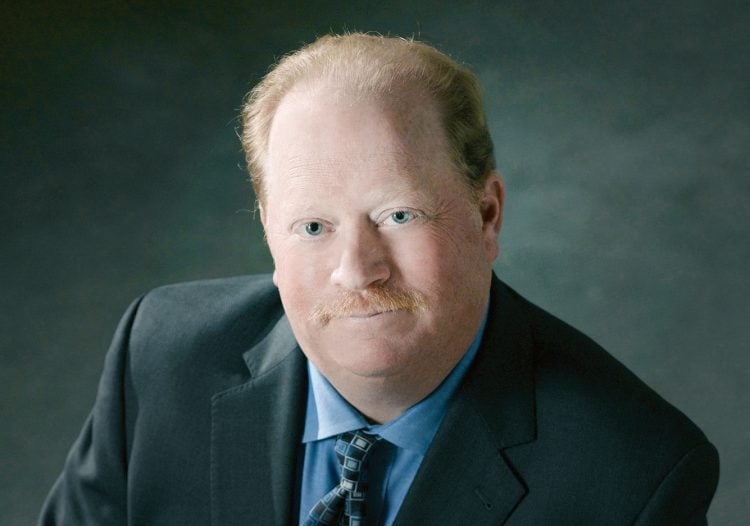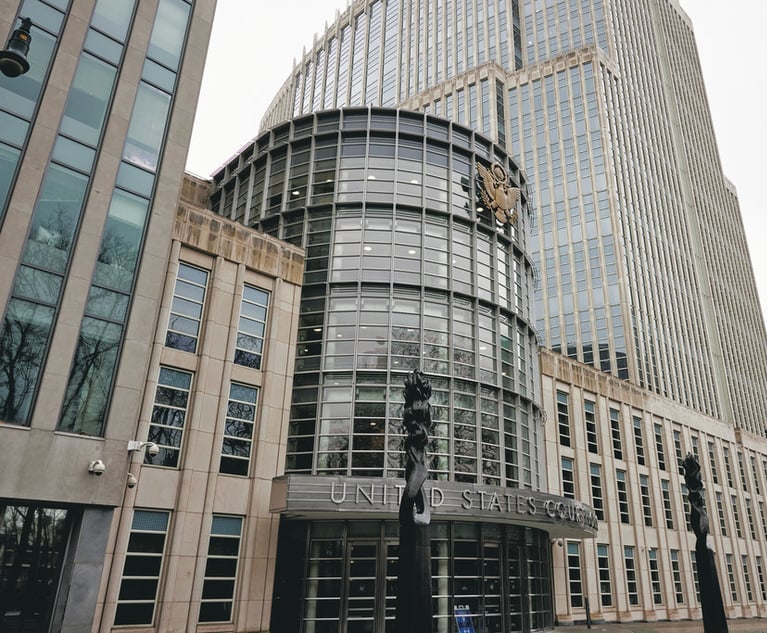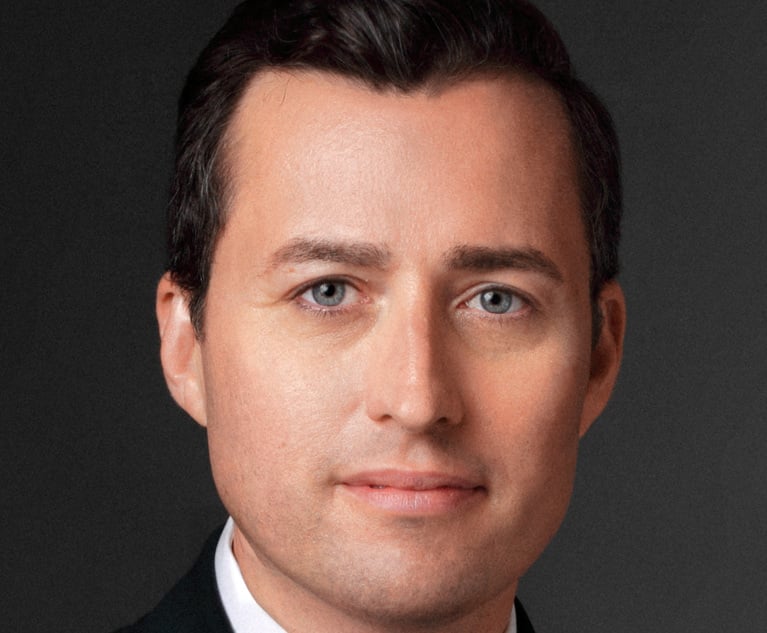Second Circuit Cases May Affect Insurers' Ability To Fight No-Fault Fraud
In his Insurance Fraud column, Evan H. Krinick discusses two cases that have the potential to significantly affect the ability of insurance companies to fight no-fault insurance fraud in New York.
March 05, 2020 at 12:30 PM
10 minute read
 Evan H. Krinick
Evan H. Krinick
A case that has been appealed to the U.S. Court of Appeals for the Second Circuit, and one that has just been argued in that court, have the potential to significantly affect the ability of insurance companies to fight no-fault insurance fraud in New York.
The defendants in Government Employees Ins. Co. v. Wellmart RX, No. 19-CV-04414 (KAM) (RLM) (E.D.N.Y. Jan. 16, 2020), have filed a notice of appeal to challenge a decision by U.S. District Judge Kiyo A. Matsumoto. The appeal in State Farm Mutual Automobile Ins. Co. v. Parisien, 352 F. Supp. 3d 215 (E.D.N.Y. 2018), is over a ruling by U.S. District Judge I. Leo Glasser.
Both cases, in essence, involve a similar (and relatively common) set of allegations: A health care provider files hundreds or thousands of arbitrations and state court lawsuits, as assignee of insureds under no-fault insurance policies, against an insurer in a situation that the insurer believes to be indicative of a pattern of fraud. The insurer goes to federal court for declaratory relief and to recover payments it asserts it had been fraudulently induced to make.
Although the legal issues are distinct, both cases address the same practical question: Can a federal district court in this situation resolve insurance companies' claims of no-fault insurance fraud against health care providers in a comprehensive and streamlined manner or can medical providers frustrate such cases by commencing voluminous arbitration and state court lawsuits against the insurer even after it has filed its federal action?
If the Second Circuit affirms the decisions by Judges Matsumoto and Glasser, both of which were clearly in favor of the insurance companies, it will significantly improve the ability of insurers to challenge what they believe to be complicated and extensive no-fault insurance fraud schemes in this state.
The 'Wellmart' Case
The Wellmart case, in which my firm represents the insurers, began on July 31, 2019 and involves allegations that, since 2015, Wellmart RX, along with its record owners (collectively, the Pharmacy Defendants), had submitted more than $7.3 million in fraudulent billing to the insurers for medically unnecessary pharmaceutical products as part of a scheme designed to exploit New York's no-fault law. The insurers are seeking a declaration that they are not legally obligated to reimburse Wellmart for over $5,700,100 in pending no-fault claims that the Pharmacy Defendants either submitted or caused to be submitted through Wellmart. The insurers also are seeking to recover approximately $1,190,700 in allegedly fraudulent bills paid to Wellmart, and they are asserting causes of action under the federal Racketeer Influenced and Corrupt Organizations Act (RICO) and for conspiracy to violate RICO, common law fraud, aiding and abetting fraud, and unjust enrichment.
The insurers moved to stay and preliminarily enjoin all collection arbitrations brought by Wellmart against the insurers under the no-fault law, see N.Y. Ins. L. § 5106(b); 11 NYCRR §65-1.1(a), (d), and to preliminarily enjoin the Pharmacy Defendants from commencing any new no-fault collection arbitrations or new civil collection lawsuits against the insurers on behalf of Wellmart until their federal action is resolved. The insurers asserted that Wellmart already was prosecuting more than 1,500 collection arbitrations seeking to recover no-fault benefits, and that it had filed almost 1,200 of those arbitrations after the insurers had filed their lawsuit. The insurers also asserted that Wellmart was prosecuting 45 civil court suits against them in state court.
The insurers argued that the procedures and practices in no-fault arbitration proceedings impose critical handicaps on them because insurers generally are not permitted to seek or obtain pre-hearing discovery beyond the discrete bill and claim at issue. As a practical matter, they argued, that obviates an insurer's ability to demonstrate a pattern of medically unnecessary treatment or fraudulent billing practices across multiple patients and claims. The insurers also contended that the arbitration procedures and civil court proceedings, occurring on a piecemeal basis, could not accommodate the time or resources necessary for them to demonstrate the complex fraudulent scheme that they alleged generated each individual bill.
The District Court's Decision
Judge Matsumoto granted the insurers' motion.
In her decision, Judge Matsumoto, applying the standard for deciding a motion for a preliminary injunction, first ruled that the insurers would suffer irreparable harm if the court denied their motion. Judge Matsumoto pointed out that the insurers argued that, absent a stay, Wellmart's collection proceedings would drain the insurers of time and resources and "invite inconsistent judicial outcomes." The court observed that the insurers were challenging the underlying no-fault claims as fraudulent and on the basis that Wellmart billed for medically unnecessary prescriptions. The court reasoned that any finding by an arbitration panel that Wellmart had submitted a valid claim would necessarily entail a finding that the underlying prescription was medically necessary and thus conflict if a declaratory judgment were entered in favor of the insurers.
Moreover, the court continued, the insurers further contended that Wellmart had sold its assets and terminated its business operations, making money damages "unlikely to provide adequate compensation." In concluding that the insurers demonstrated irreparable harm absent a stay, the court added that the record "strongly" suggested that Wellmart was rendering itself judgment-proof to frustrate any potential money judgment awarded to the insurers.
Judge Matsumoto next decided that the insurers had "easily" met the second prong of the preliminary injunction standard by showing a "serious question going to the merits"—namely, whether the Pharmacy Defendants "were prescribing medically necessary treatments." The court pointed out that the insurers' complaint provided a "detailed narrative" of 50 different instances in which the Pharmacy Defendants dispensed what appeared to have been excessive amounts of pharmaceutical products, often without appropriate documentation or reference to such products in medical reports. The court added that the insurers' complaint appended "extensive documentation" to support their claims of fraudulent and medically unnecessary treatment, including a list of nearly 15,000 allegedly fraudulent claims identified by the insurers as of the complaint's filing date.
After concluding that the balance of hardships "tipped decidedly" in the insurers' favor, Judge Matsumoto granted the insurers' motion to stay, pending resolution of the insurers' federal action, all of the pending no-fault collection arbitrations by or on behalf of Wellmart against the insurers and to enjoin the Pharmacy Defendants from filing any future no-fault collection arbitrations and future no-fault collection lawsuits in New York state courts.
The 'Parisien' Case
The insurers that brought the Parisien case allege that, since August 2013 and "continu[ing] uninterrupted since that time," the defendant health care providers subjected their insureds to a suite of medically unnecessary interventions to defraud the insurers and exploit their insureds' no-fault benefits. The insurers contend that the defendants had submitted bills totaling more than $9.5 million, of which $3.3 million were paid. The insurers are seeking damages for benefits they paid under no-fault automobile insurance policies for services rendered or purportedly rendered by the defendants. They also are seeking a declaratory judgment that the defendants are not entitled to collect any future no-fault benefits for services rendered through the pendency of the litigation. The insurers assert claims under RICO and for common law fraud and unjust enrichment.
The insurers in Parisien moved for, among other things, an order staying pending lawsuits in New York state court brought by the defendants against the insurers to collect no-fault benefits. They alleged that the defendants had filed, among other things, at least 2,300 lawsuits in New York state court against them and that the defendants would continue to bring state actions during the federal court litigation to collect remaining billed and unpaid benefits.
Judge Glasser granted the insurers' motion.
In his decision, the court explained that it had the authority to enjoin the pending actions under the provision of the All-Writs Act, which provides that federal courts "may issue all writs necessary or appropriate in aid of their respective jurisdictions and agreeable to the usages and principles of law." 28 U.S.C. §1651(a). Judge Glasser added that the court's authority to enjoin pending state proceedings is limited by the Anti-Injunction Act (AIA), 28 U.S.C. § 2283, which provides that a federal court may not stay proceedings in a state court except "[1] as expressly authorized by Act of Congress, or [2] where necessary in aid of its jurisdiction, or [3] to protect or effectuate its judgments."
Judge Glasser relied on the second exception to the AIA as the basis for granting the injunction requested by the insurers. Judge Glasser found that the pendency of the "colossal" number of individual no-fault actions would render trial in state court "so gravely difficult and inconvenient" for the insurers that, for all practical purposes, they would be deprived of their day in court.
The court noted that the insurers allege that the defendants had systematically and concertedly administered treatments in a rote fashion, independent of the clinical needs of the patients, in such a combination as to maximize reimbursements while minimizing the possibility of detection through the use of various controlled entities. According to the court, these alleged violations might "not be apparent if the claims and their supporting documentation are examined in isolation on a case-by-case basis" and it is "only by analyzing the claims as a whole" that the "irresistible inference" arises that the treatments were "not being provided on the basis of medical necessity."
The insurers, Judge Glasser added, might not as a practical matter have a fair opportunity to present their claims unless they are permitted to direct the trier of fact to all of the claims at issue. Judge Glasser said that failure to enjoin the state actions would "destroy the utility of the [declaratory judgment procedure] otherwise ideally suited to resolving such broad claims."
Finally, Judge Glasser said, enjoining the state actions in this case would serve the public policy of New York "in combatting insurance fraud in the no-fault sector."
Judge Glasser concluded by finding, as Judge Matsumoto did in Wellmart, that a preliminary injunction was warranted because (1) of the irreparable harm the insurers otherwise would suffer; (2) of the existence of a serious question going to the merits; and (3) the balance of hardships tipped "decidedly" in favor of the insurers.
It is important to note that the insurers are arguing to the Second Circuit that, alternatively, it can affirm Judge Glasser's decision under the AIA's first exception: as "expressly authorized by Act of Congress." In particular, the insurers point out that they are bringing claims against the defendants under RICO and that RICO authorizes preliminary injunctive relief to "prevent and restrain" further violations of that law.
Conclusion
Insurance companies, policyholders, health care providers, and third parties concerned about no-fault insurance fraud should pay close attention to Wellmart and Parisien, and should keep an eye on how they are resolved by the Second Circuit. From the perspective of fighting no-fault insurance fraud in New York, it can be stated quite simply: The Second Circuit must affirm both decisions. Doing so would send forth a strong statement of a federal district court's ability to comprehensively, efficiently, and effectively resolve these kinds of disputes.
Evan H. Krinick, managing partner of Rivkin Radler, can be reached at [email protected]. The author's firm represents the insurance companies in the 'Wellmart' case discussed in this column.
This content has been archived. It is available through our partners, LexisNexis® and Bloomberg Law.
To view this content, please continue to their sites.
Not a Lexis Subscriber?
Subscribe Now
Not a Bloomberg Law Subscriber?
Subscribe Now
NOT FOR REPRINT
© 2025 ALM Global, LLC, All Rights Reserved. Request academic re-use from www.copyright.com. All other uses, submit a request to [email protected]. For more information visit Asset & Logo Licensing.
You Might Like
View All
Uber Files RICO Suit Against Plaintiff-Side Firms Alleging Fraudulent Injury Claims
3 minute read
Insurance Company Sues Over 180 Health Care Providers for Fraud Under RICO
3 minute read
New York Court of Appeals Tightens Pleading Standards Against Insurance Policyholder
7 minute read
Amid Growing Litigation Volume, Don't Expect UnitedHealthcare to Change Its Stripes After CEO's Killing
6 minute readLaw Firms Mentioned
Trending Stories
- 1States Accuse Trump of Thwarting Court's Funding Restoration Order
- 2Microsoft Becomes Latest Tech Company to Face Claims of Stealing Marketing Commissions From Influencers
- 3Coral Gables Attorney Busted for Stalking Lawyer
- 4Trump's DOJ Delays Releasing Jan. 6 FBI Agents List Under Consent Order
- 5Securities Report Says That 2024 Settlements Passed a Total of $5.2B
Who Got The Work
J. Brugh Lower of Gibbons has entered an appearance for industrial equipment supplier Devco Corporation in a pending trademark infringement lawsuit. The suit, accusing the defendant of selling knock-off Graco products, was filed Dec. 18 in New Jersey District Court by Rivkin Radler on behalf of Graco Inc. and Graco Minnesota. The case, assigned to U.S. District Judge Zahid N. Quraishi, is 3:24-cv-11294, Graco Inc. et al v. Devco Corporation.
Who Got The Work
Rebecca Maller-Stein and Kent A. Yalowitz of Arnold & Porter Kaye Scholer have entered their appearances for Hanaco Venture Capital and its executives, Lior Prosor and David Frankel, in a pending securities lawsuit. The action, filed on Dec. 24 in New York Southern District Court by Zell, Aron & Co. on behalf of Goldeneye Advisors, accuses the defendants of negligently and fraudulently managing the plaintiff's $1 million investment. The case, assigned to U.S. District Judge Vernon S. Broderick, is 1:24-cv-09918, Goldeneye Advisors, LLC v. Hanaco Venture Capital, Ltd. et al.
Who Got The Work
Attorneys from A&O Shearman has stepped in as defense counsel for Toronto-Dominion Bank and other defendants in a pending securities class action. The suit, filed Dec. 11 in New York Southern District Court by Bleichmar Fonti & Auld, accuses the defendants of concealing the bank's 'pervasive' deficiencies in regards to its compliance with the Bank Secrecy Act and the quality of its anti-money laundering controls. The case, assigned to U.S. District Judge Arun Subramanian, is 1:24-cv-09445, Gonzalez v. The Toronto-Dominion Bank et al.
Who Got The Work
Crown Castle International, a Pennsylvania company providing shared communications infrastructure, has turned to Luke D. Wolf of Gordon Rees Scully Mansukhani to fend off a pending breach-of-contract lawsuit. The court action, filed Nov. 25 in Michigan Eastern District Court by Hooper Hathaway PC on behalf of The Town Residences LLC, accuses Crown Castle of failing to transfer approximately $30,000 in utility payments from T-Mobile in breach of a roof-top lease and assignment agreement. The case, assigned to U.S. District Judge Susan K. Declercq, is 2:24-cv-13131, The Town Residences LLC v. T-Mobile US, Inc. et al.
Who Got The Work
Wilfred P. Coronato and Daniel M. Schwartz of McCarter & English have stepped in as defense counsel to Electrolux Home Products Inc. in a pending product liability lawsuit. The court action, filed Nov. 26 in New York Eastern District Court by Poulos Lopiccolo PC and Nagel Rice LLP on behalf of David Stern, alleges that the defendant's refrigerators’ drawers and shelving repeatedly break and fall apart within months after purchase. The case, assigned to U.S. District Judge Joan M. Azrack, is 2:24-cv-08204, Stern v. Electrolux Home Products, Inc.
Featured Firms
Law Offices of Gary Martin Hays & Associates, P.C.
(470) 294-1674
Law Offices of Mark E. Salomone
(857) 444-6468
Smith & Hassler
(713) 739-1250






